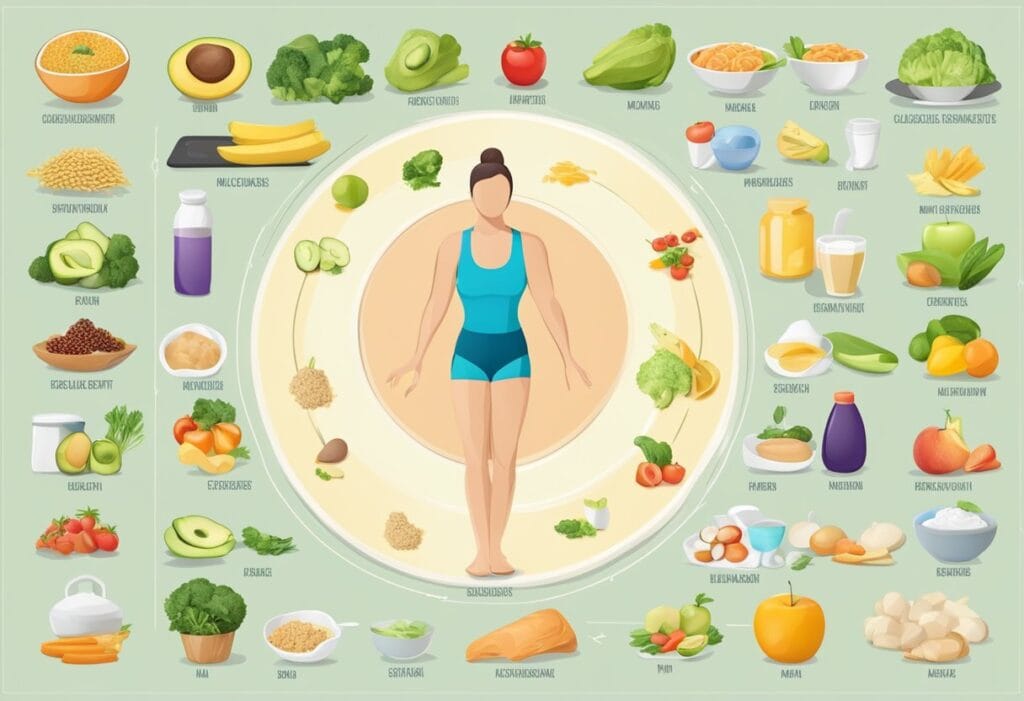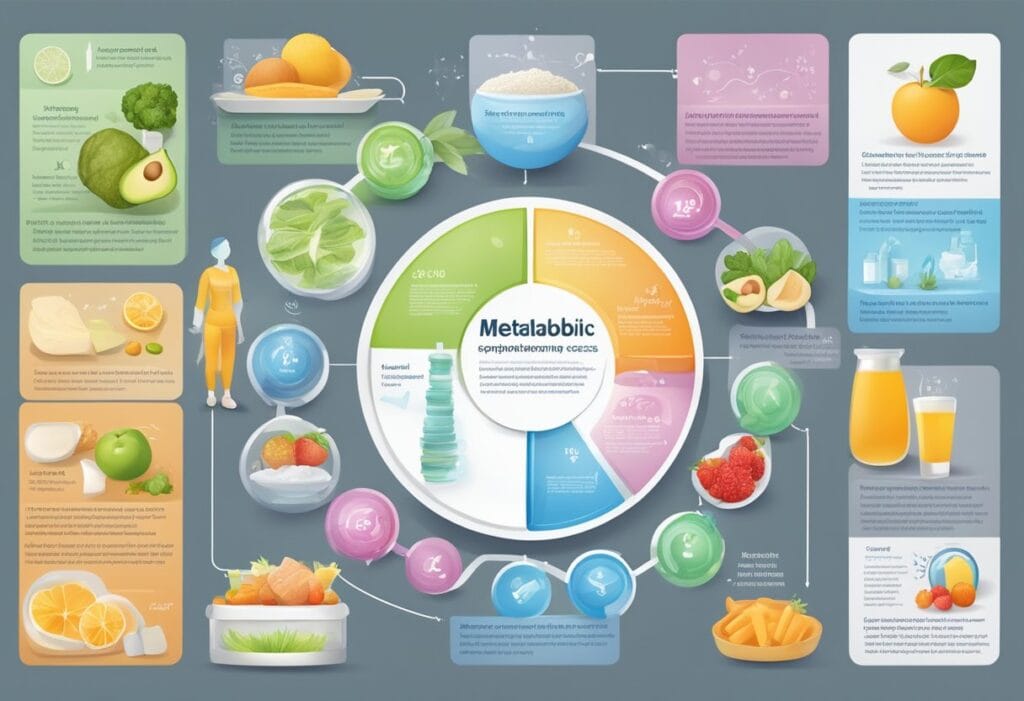Metabolism plays a crucial role in maintaining a healthy weight. It is the process by which our body converts food and drinks into energy. The rate at which we burn calories is determined by our metabolism, which is influenced by several factors, including age, gender, genetics, and body composition. Understanding metabolism is essential for weight management, as it helps us to make informed decisions about diet, exercise, and lifestyle.

Diet and nutritional influence are significant factors that affect our metabolism. Consuming a balanced diet that includes whole foods, lean proteins, and healthy fats can help boost metabolism. Certain foods, such as spicy foods, green tea, and coffee, have been shown to increase metabolism and promote weight loss. However, consuming too many processed foods, sugary drinks, and unhealthy fats can slow down metabolism and lead to weight gain.
Physical activity and exercise are also essential for maintaining a healthy weight. Regular exercise can help boost metabolism and burn calories. Strength training, in particular, can help build muscle mass, which can increase metabolism and improve weight management. Lifestyle factors, such as stress, sleep, and smoking, can also affect metabolism and weight management.
Overview
Key Takeaways
- Metabolism plays a crucial role in weight management.
- Diet and exercise are essential for maintaining a healthy metabolism.
- Lifestyle factors, such as stress and sleep, can affect metabolism and weight management.
Understanding Metabolism
Metabolism is a complex process by which the body converts food and drink into energy. It is the sum total of all the chemical reactions that occur in the body to sustain life. In simple terms, metabolism refers to the rate at which our body burns calories to produce energy.
Basics of Metabolism
The basal metabolic rate (BMR) is the amount of energy our body needs to sustain its basic functions at rest. It includes the energy required for breathing, circulating blood, and maintaining body temperature. Our BMR is largely determined by our body composition, age, and gender.
Factors Affecting Metabolic Rate
Several factors can affect our metabolic rate, including our body size and composition, genetics, age, and hormones. For example, muscle tissue burns more calories than fat tissue, so people with more muscle mass tend to have a higher metabolic rate. Thyroid hormones also play a crucial role in regulating metabolism.
Metabolism and Age
As we age, our metabolism naturally slows down. This is partly due to a decrease in muscle mass and an increase in body fat. However, other factors such as hormonal changes and a decrease in physical activity can also contribute to a slower metabolic rate.
Understanding how metabolism works can help us make informed decisions about our diet and lifestyle. While we cannot change our genetics or age, we can take steps to boost our metabolism, such as increasing our muscle mass through strength training and staying physically active. This can be particularly important for weight management, as a faster metabolism can help us burn more calories and maintain a healthy weight.
Diet and Nutritional Influence
When it comes to weight management, diet and nutrition play a crucial role in regulating metabolism. A balanced and nutrient-dense diet is essential for maintaining a healthy metabolism and achieving weight management goals. In this section, we will discuss the impact of macronutrients, caloric intake, and the thermic effect of food on metabolism.
Macronutrients and Metabolism
Macronutrients, such as protein, fats, and carbohydrates, are the building blocks of our diet. They provide the body with energy, support growth and repair, and regulate metabolism. Protein is particularly important for weight management as it helps to build and maintain muscle mass, which in turn increases metabolism. Fats and carbohydrates also play a role in metabolism, but it is important to consume them in moderation and as part of a balanced diet.
Impact of Caloric Intake
Caloric intake is a crucial factor in weight management. Consuming too many calories can lead to weight gain, while consuming too few calories can slow down metabolism and make weight loss more difficult. It is important to find the right balance of calories to support a healthy metabolism and achieve weight management goals.
Thermic Effect of Food
The thermic effect of food is the energy required by the body to digest, absorb, and metabolize food. Different macronutrients have different thermic effects, with protein requiring the most energy to digest, followed by carbohydrates and fats. Consuming a diet that is high in protein can help to increase metabolism and support weight management goals.
In conclusion, diet and nutrition play a crucial role in regulating metabolism and achieving weight management goals. Consuming a nutrient-dense and balanced diet, finding the right balance of calories, and considering the thermic effect of food are all important factors to consider when it comes to weight management.
Physical Activity and Exercise

Regular physical activity and exercise are essential components of a healthy lifestyle and weight management. Exercise helps us burn more calories, increase our energy expenditure, and improve our overall health. In this section, we will explore the role of exercise in weight loss, the types of exercise that are most effective for metabolism, and the importance of strength training for muscle mass.
Exercise’s Role in Weight Loss
Exercise is an essential component of any weight loss program. When we engage in physical activity, we burn calories, which helps create a calorie deficit that can lead to weight loss. Additionally, exercise helps increase our energy expenditure, which means we burn more calories even when we are not exercising. This increased energy expenditure can help us achieve our weight loss goals more quickly and effectively.
Types of Exercise for Metabolism
Not all exercise is created equal when it comes to metabolism and weight management. High-intensity interval training (HIIT) has been shown to be particularly effective for increasing metabolism and burning calories. HIIT involves short bursts of intense exercise followed by periods of rest or low-intensity exercise. This type of exercise can help increase our energy expenditure and improve our overall fitness levels.
Cardiovascular exercise, such as running, cycling, or swimming, is also effective for weight management. This type of exercise helps increase our heart rate and burn calories. Additionally, strength training can help increase our muscle mass, which can help us burn more calories even when we are not exercising.
Strength Training and Muscle Mass
Strength training is an essential component of any exercise program. When we engage in strength training, we build muscle mass, which can help increase our metabolism and burn more calories. Additionally, strength training can help improve our overall fitness levels and reduce our risk of injury.
In conclusion, physical activity and exercise are essential components of a healthy lifestyle and weight management. By engaging in regular exercise, we can burn more calories, increase our energy expenditure, and improve our overall health. To achieve the best results, we should focus on high-intensity interval training, cardiovascular exercise, and strength training.
Lifestyle Factors and Weight Management

When it comes to weight management, lifestyle factors play a crucial role. By making some simple lifestyle changes, we can boost our metabolism and improve our overall health. In this section, we will discuss three important lifestyle factors that can help with weight management: sleep, stress, and healthy eating habits.
Sleep and Metabolism
Getting enough sleep is essential for weight management. Lack of sleep can disrupt our hormones and slow down our metabolism, leading to weight gain. Studies have shown that people who get less than seven hours of sleep per night are more likely to be overweight or obese. To improve our sleep quality, we should aim for at least seven to nine hours of sleep per night. We can also try to establish a regular sleep schedule, avoid caffeine and alcohol before bedtime, and create a relaxing sleep environment.
Stress and Hormonal Balance
Stress can also affect our metabolism and hormonal balance, leading to weight gain. When we are stressed, our body produces cortisol, a hormone that can increase our appetite and promote fat storage. To manage stress, we can try relaxation techniques such as deep breathing, meditation, or yoga. We can also engage in physical activity, which can help to reduce stress and boost our metabolism.
Healthy Eating Habits
Eating a healthy diet is essential for weight management. We should aim to eat a balanced diet that includes plenty of fruits, vegetables, whole grains, and lean protein. We should also avoid processed foods, sugary drinks, and foods high in saturated and trans fats. Eating smaller, more frequent meals throughout the day can also help to boost our metabolism and prevent overeating.
By making these simple lifestyle changes, we can improve our metabolism and achieve our weight management goals. Remember, small changes can lead to big results, so start making healthy choices today!
Challenges and Considerations

When it comes to weight management, there are several challenges and considerations to keep in mind. In this section, we will discuss some of the most common challenges and considerations that individuals may face on their weight management journey.
Obesity and Metabolic Syndrome
Obesity is a major risk factor for metabolic syndrome, a cluster of conditions that includes high blood pressure, high blood sugar, excess body fat around the waist, and abnormal cholesterol levels. Metabolic syndrome can increase the risk of heart disease, stroke, and other health problems.
Individuals with obesity may have a slower metabolism, making it more difficult for them to lose weight. In addition, they may have an increased risk of developing insulin resistance, which can further impact their ability to manage their weight.
Weight Loss Plateaus and Set Point
Weight loss plateaus are a common challenge that individuals may face during their weight management journey. A weight loss plateau occurs when an individual stops losing weight despite continued efforts to do so. This can be frustrating and demotivating for individuals who are working hard to lose weight.
One possible explanation for weight loss plateaus is the concept of a “set point.” The set point theory suggests that the body has a predetermined weight range that it tries to maintain. When an individual loses weight, their body may try to resist further weight loss by slowing down their metabolism or increasing their hunger levels.
Medication and Metabolic Impact
Certain medications can have an impact on an individual’s metabolism and weight management efforts. For example, some antidepressants and antipsychotics can cause weight gain as a side effect.
Individuals who are taking medication and are struggling to manage their weight should talk to their healthcare provider about potential alternatives or strategies to mitigate the impact of their medication on their weight.
Overall, there are several challenges and considerations to keep in mind when it comes to weight management. By understanding these challenges and working with healthcare providers to develop a personalized weight management plan, individuals can improve their chances of success in achieving and maintaining a healthy weight.
Metabolism Booster for Weight Loss
| Short Name | Rating | Price |
|---|---|---|
| BIOTEQUELAB Diet Drops | 4.6 | $32.77 |
| Sculpt Nation Burn | 4.5 | $39.99 |
| ALPHA LION Superhuman | 4.4 | $59.99 |
| Jacked Factory Burn-XT Max | 4.4 | $39.99 |
| One A Day Women’s Multivitamin | 4.3 | $9.99 |
| Life Extension AMPK Activator | 4.2 | $24.94 |
| Hydroxycut Hardcore Elite | 4.1 | $30.04 |
| UNALTERED Fat Burner for Men | 4.1 | $27.99 |
| Best Diet Pills for Women | 4.1 | $19.95 |
| Pendulum Metabolic Daily | 4.0 | $55.00 |
| MOTO Metabolism Support | 4.0 | $31.99 |
| Lemme Curb | 3.9 | $40.00 |
| Green Tea Weight Loss Pills | 3.9 | $19.95 |
| Burn-XT Fat Burner | 3.8 | $27.99 |
| Fat Burners For Women | 3.8 | $19.95 |
| Night Time Fat Burner | 3.6 | $19.89 |
| ACV Keto Gummies | 3.6 | $59.95 |
| OLLY Combat Cravings | 3.7 | $16.88 |
| Puravive Weight Loss Capsules | 3.0 | $39.95 |
*Please note that prices are subject to change and may vary depending on the seller, location, and any applicable discounts or promotions. The ratings provided are based on customer reviews and may also change over time. Amazon Affiliate Link.










